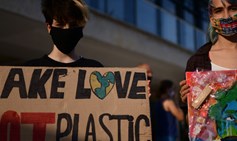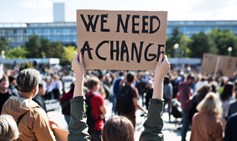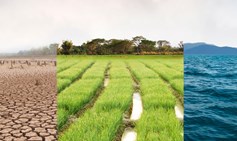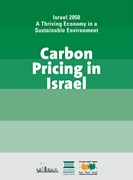Climate Change Project
Since 2019, the Israel Democracy Institute has been working with the Ministry of Environmental Protection and additional Ministries, to spearhead the national strategic effort to switch to a low- or zero-emissions economy. The joint leadership on this project focuses on the steps that are required to prepare for climate change and its associated risks, to promote a reduction in emissions, and to adopt Green Technologies. A significant component of this activity is the recruitment of partners for these efforts from the other government ministries and other sectors of the economy, by means of working groups, conferences, and the provision of professional support, in the form of economic models and policy research.
The partnership has included the management of multi-sector professional working groups that have defined the national vision for 2050 (adaptation and mitigation) in the domains of energy, transportation, urban planning, industry and waste.
IDI experts also directed the professional teams that focused on additional other topics:
• Macroeconomic effects and carbon pricing (led by Prof. Nathan Sussman and Prof. Ruslana Palatnik)
• Financial regulation in the light of climate change (led by Prof. Karnit Flug)
• A just transition and vulnerable population groups (led by Daphna Aviram-Nitzan)
• The removal of barriers in the business and climate tech sectors (led by Daphna Aviram-Nitzan)
• A just transition to green employment (led by Daphna Aviram-Nitzan)
• Promoting regional climate tech cooperation in MENA countries (led by Dr. Eyal Hulata)
Current Projects:
Removing Barriers between the Business Sector and the Government
The business sector and government working group focused on promoting a competitive low-carbon economy, launched in early 2021, is overseen by the IDI team and the Ministry of Environmental Protection. The group, which meets every other month, draws its members from ministries, various business sectors, and other stakeholders. Its goal is to remove barriers in the interface between the business sector and regulators, towards achieving a low-emissions economy. The group is surveying the barriers that the business sector must contend with while implementing government decisions and is studying ways to remove them. In addition, its meetings serve as a platform at which the government can present legislative proposals and policy measures that affect the business sector, in order to receive feedback and suggestions for improving the policies to ensure that their implementation is feasible.
Coordination and Synchronization of the Financial Regulations related to the Transition to a Low-Emissions Economy
This team, led by Prof. Karnit Flug and with the participation of the three financial regulators, is working on advancing the financial institutions’ preparations for the climate crisis, including the adoption of fiscal regulations for managing the financial risks derived from the preparations for the transition to a low-carbon economy. IDI’s activity in this area, along with the Ministry of Environmental Protection, will improve the relations between the financial regulators and the regulatees, enable the Israeli economy to continue its trade relations with international markets in developed countries, and allow the Israeli business sector to receive financing to expand its activity, and thereby prevent any damage to its competitive ability.
Green Employment – Promising a Just Transition to a Low-Carbon Economy
The project focuses on identifying vulnerable population groups and ensuring a just transition in the labor market: Examining the anticipated impact of the transition to a low-emission economy on the Israeli labor market, including estimates of the extent of harm to vulnerable sectors and on how many jobs will be affected; Mapping out the sectors and jobs that will be harmed, as well as new positions and professions that will open up. IDI researchers analyze the changes that will be required in labor relations and legislation, with an emphasis on terms of employment. They also focus on the existing barriers in labor relations in Israel that could potentially delay the transition to a low-emission economy. The research implements the Tri-Party approach which supports collective agreements involving the government-employers-and employees and which strengthens governance and reinforces a culture of dialogue and broad consensus on social and economic issues.



















